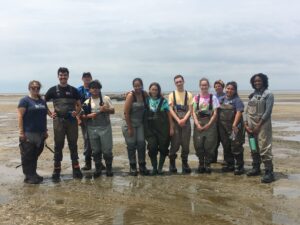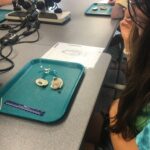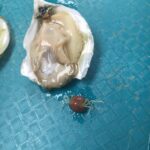Building Aquaculture Career Interest and Competencies Through Student Engagement in a Pilot Apprenticeship Program
Shellfish farming is an important and ever growing sector in New Jersey’s coastal economy. Given the continuing entry of new shellfish farmers and planned expansion of existing farms in the State, further growth is inevitable and would result in significant ecological and economic benefits while providing high quality sustainable seafood to meet increasing consumer demand.
The new Apprenticeship in Shellfish Aquaculture Program (ASAP) is an initiative offered through a partnership between New Jersey Sea Grant Consortium and Rutgers University that offers high school students an opportunity to learn about aquaculture while getting their “feet wet” in the field through virtual and experiential training. The purpose of this pilot project is to introduce middle and high school students and their communities to aquaculture as a career opportunity and an emerging and important food production system. By providing a pathway to enter careers in this growing sector, ASAP provides students with an understanding of the field of shellfish aquaculture and helps them build necessary skills so that they are employment-ready and primed for a successful career start.
Project development began in summer 2021, when collaborators engaged NJ educators interested in increasing aquaculture literacy in their schools with industry professionals in a 3-day workshop to develop curriculum content, discuss instructional approaches and to identify necessary employment skills. Teachers then recruited students for ASAP in spring 2022, which employs a three-fold approach: virtual workshops, in-person “boot camp” and 20-hour farm work experience.
Beginning in May, seven high school students participated in four hour-long virtual workshops where they learned about local and global applications of aquaculture and had the opportunity to interact with researchers, professionals and shellfish growers. During the week of June 27, ASAP students participated in the second program component: a 1-week summer training “boot camp” that offered in-class lessons and field experiences at Rutgers University’s Cape Shore Laboratory and Aquaculture Innovation Center in Cape May County.
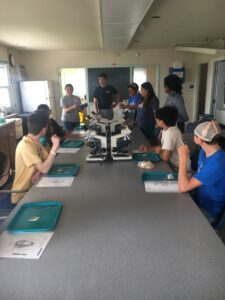
Students learning about oyster ecology & biology from Michael Acquafredda, PhD post-doc from NOAA NEFSC
According to Diana Burich, Director of Education and co-creator of the program, “As the aquaculture industry in New Jersey grows, there is a real need to help shellfish farmers find competent employees. ASAP is an opportunity for students who already have an interest in shellfish aquaculture to be immersed in learning about this food source, how products are grown and marketed, and what it really takes to make that happen. The students were full of enthusiasm and enjoyed the activities, and the entire group, collaborators and students alike, were understanding of the importance of this project. Whether students plan to pursue aquaculture in college or head directly out into the workforce, NJSGC has a responsibility as a resource in helping to bring these two sectors together and provide relevant opportunities for growth.”
- Oyster dissection, pea crab & using dye to show how oysters transfer particulates across gills
- Oyster dissection, pea crab & using dye to show how oysters transfer particulates across gills
Facilitated by Burich and collaborators Jenny Shinn of Rutgers University’s Haskin Shellfish Research Laboratory and Lisa Calvo of Sweet Amalia Oyster Farm, students learned about the biology and ecology of oysters and hard clams, two economically-important species grown in NJ. Students toured Cape May Salt oyster farm, built farm gear, and helped maintain “crops” to keep them fouling- and disease-free. Staff and interns at the Aquaculture Innovation Center and Cape Shore Lab led students through hatchery and husbandry operations, where students learned about life stages and the importance of algae in the production of larval spat.. Experts like Michael Acquafredda, PhD, National Research Council’s postdoctoral research associate from National Oceanic and Atmospheric Administration Northeast Fisheries Science Center (NOAA NEFSC) and Douglas Zemeckis, PhD, Rutgers University’s Cooperative Extension Agriculture and Natural Resources County Agent, met with students and talked about current research and shellfish farms as agricultural and commercial businesses . Students even learned to shuck oysters, identify flavor profiles and cook Oysters Rockefeller.
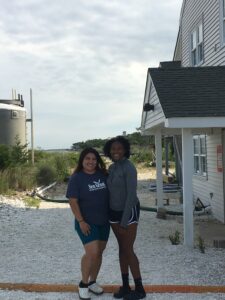
NJSGC’s Coastal and Marine Science Education and Community Engagement intern, Catherine Rodriguez with Jihyana Price, NOAA IN-FISH intern.
Students are currently in the final phase of the program: 20-hour farm experience where they will gain experience in aquaculture-related work thanks to collaborating industry partners such as Sweet Amalia Oyster Farm in Cape May Courthouse and Forty North Oyster Farm in Barnegat. Upon completion of the program, students will receive a Shellfish Aquaculture Apprenticeship Certificate of Accomplishment, a stipend for their participation and a greater appreciation for New Jersey’s shellfish farmers and the aquaculture industry overall collaboration with industry and academic project partners
